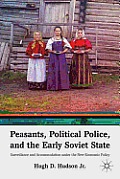New Faculty Publication: Peasants, Political Police, and the Early Soviet State: Surveillance and Accommodation under the New Economic Policy
 Prof. Hugh D. Hudson, Jr., of the History Department has just published the book Peasants, Political Police, and the Early Soviet State: Surveillance and Accommodation under the New Economic Policy (2012).
Prof. Hugh D. Hudson, Jr., of the History Department has just published the book Peasants, Political Police, and the Early Soviet State: Surveillance and Accommodation under the New Economic Policy (2012).
Professor Hudson specializes in the history of both Imperial Russia and the Soviet Union with special attention to the role of marginal social groups in shaping the culture and economic structure of the country.
“This book combines social and institutional histories of Russia, focusing on the secret police and their evolving relationship with the peasantry in the period leading up to collectivization. Based on an analysis of Cheka/OGPU reports, the book argues that the police did not initially respond to peasant resistance to Bolshevik demands simply with the gun – rather, they listened to peasant voices. The police argued that compromise was possible, and that the peasants could be convinced to work within the Bolshevik construct of state and society. As time went on, however, local police agents increasingly saw themselves engaged in a war with the peasantry over control of grain and domination of local organs of power. As the focus shifted from objective economic factors to the putative influence of the kulaks, the only solution became to break the peasantry.” (from publisher’s information).
His recent publications include Modernization Through Resistance: War, Mir, Tsar, and Law in the World of the Pre-reform Russian Peasantry (2004); Blueprints and Blood: The Stalinization of Soviet Architecture, 1917-1937 (1994); The Rise of the Demidov Family and the Russian Iron Industry in the Eighteenth Century (1986) translated as Pervye Demidovy i razvitie chernoi metallurgii Rossii v XVIII veke (2011); “The Kulakization of the Peasantry: The OGPU and the End of Faith in Peasant Reconciliation, 1924-1927,” Jahrbücher für Geschichte Osteuropas (2012; forthcoming); “Peasant-State Relations During the Formative Years of the New Economic Policy,” Canadian Slavonic Papers (2008); “Shaping Peasant Political Discourse during the New Economic Policy: The Newspaper Krest’ianskaia gazeta and the Case of ‘Vladimir Ia.’,” Journal of Social History (2002); “Religious Persecution and Industrial Policy in the Reign of Anna I: V. N. Tatishchev and the Old Believers Reconsidered,” Jahrbücher für Geschichte Osteuropas (2002; print); “A Rhetorical War of Fire: The Middle Volga Arson Panic of 1839 as Contested Legitimacy in Prereform Russia,” Canadian Slavonic Papers (2001; print); “‘Even if You Cut Off Our Heads’: Russian Peasant Legal Consciousness in the First Half of the Nineteenth Century,” Canadian-American Slavic Studies (2001; print); “An Unimaginable Community: The Failure of Nationalism in Russia During the Nineteenth and Early-Twentieth Centuries,” Russian History (2000); “Proletarians by Fiat: The Compulsory Ural Metallurgical Work Force, 1630-1861,” International Labor and Working-Class History (1995; with Bruce J. DeHart and David M. Griffiths); “Terror in Architecture: The Murder of Mikhail Okhitovich,” Slavic Review (1992); “‘The Social Condenser of Our Epoch’: The Association of Contemporary Architects and the Creation of a New Way of Life in Revolutionary Russia.” Jahrbücher für Geschichte Osteuropas (1986; print).
Congratulations to Prof. Hudson!